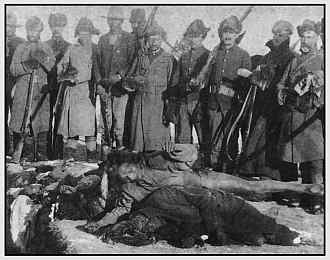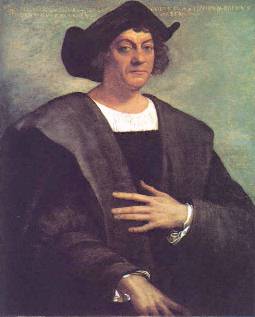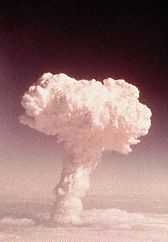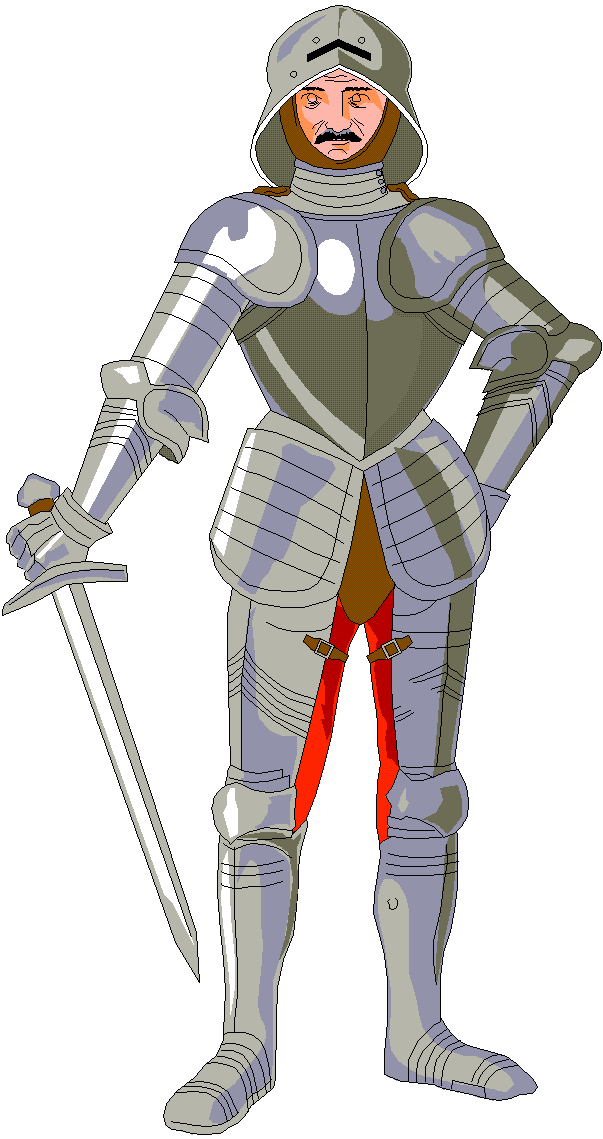 The following is a response to a pro-Columbus column by Michael Berliner:
The following is a response to a pro-Columbus column by Michael Berliner:
 The following is a response to a pro-Columbus column by Michael Berliner:
The following is a response to a pro-Columbus column by Michael Berliner:
This Ain't No Party, This Ain't No Disco
A Columbus Day Rant
By Rob Schmidt
Ever since the Columbus Quincentennial, critics have been doing their best to demolish the tenets of multiculturalism. These carpers have glorified Columbus's "discovery" of America and say we all should do the same. Unfortunately, their arguments are often so lacking, so full of half-truths and omissions, that they cry out for a response.
The critics extol the virtues of Western thought—"great creativity, scientific achievement and philosophical ferment," according to one—but their history is skewed from the beginning. Many civilizations, both Western and non-Western, developed agriculture, writing, metallurgy, and the wheel. Moreover, these and other innovations, such as Hammurabi's code and the Judeo-Christian ethic, came long before the advent of "Western rationality." The ancients weren't inspired by cold logic, but rather by visions from the gods.
The traditionalists claim much for our civilization, but ignore the achievements of others. The Chinese gave us gunpowder, silk, printing, and the blast furnace. The Islamic empire preserved Aristotle's teachings while the West plunged into the Dark Ages. The Mayas' mathematics, calendar, and astronomy were at least as advanced as Europe's in 1492.
In contrast, Columbus's world was nothing short of barbaric. City-states warred incessantly. Mercenaries raped and pillaged. The Pope sold pardons for sins. Jews were expelled from Spain. "Witches" were hung and burned. Thieves were drawn and quartered. Patients were bled to death. Scientists had to recant findings. Three-fifths of the children died before age five.
Many of the old guard seem ignorant of the first Americans, who were far from being the base savages they describe. Native Americans had many permanent settlements and towns; the Hopi village of Oraibi has been inhabited continuously since A.D. 1250. Agriculture was widespread; many farmed so successfully that modern science has been unable to improve on their methods. Native Americans practiced every form of government; our U.S. model is based partly on the Iroquois'. Their religions encompassed every belief from sun worship to monotheism, and were as layered and textured as Christianity. They had complex myths and languages; while Shakespeare wrote with 24,000 words, the Nahuatl of Mexico used 27,000. One could go on and on.
Because war and disease decimated the Indians' cultures, does that make these cultures inferior? We lost in Vietnam and we're suffering from AIDS, so what does that say about us? Is endurance the sole measure of greatness? If so, we must proclaim ancient Egypt the cultural acme, because it survived almost 3,000 years.

Reason? Science? Sure, Western civilization has given us electricity, antibiotics, plastics, and computers. It's also invented crack cocaine, razed the Amazon jungle, depleted the ozone layer, and obliterated Hiroshima. Reason and science are only as good as the humanity that employs them.
Were Shakespeare's sonnets, Beethoven's symphonies, and Picasso's paintings the products of Western science, or of unique passion and sentiment? Were they created in the spirit of rationality, or in spite of it? Indeed, what makes a culture great? How can anyone say one art or literature is better than another?
Individualism? Self-reliance? Sure, we applaud those individuals—Copernicus, Magellan, the Pilgrims, Newton, Darwin, the Wright brothers, Einstein—who have dared to explore the unknown. But don't Hitler and Stalin, McCarthy and Nixon, Oswald and Speck equally represent these Western traits? Isn't our murder rate, our moral decay, a concomitant result?
What of the pyramids, the Great Wall of China, Notre Dame, the Panama Canal, our World War II effort, or putting the first man on the moon? What of the very founding of this nation, which the naysayers rightly consider a historic milestone? Weren't these all group efforts, testaments to what humanity can do collectively?
The problem isn't that multiculturalists want to tear down the accomplishments of Western civilization. We all agree reason and individualism have led to remarkable achievements, this country's not the least.
The problem is that the critics want us to sanctify these values, to codify them in stone. They want us to declare that history has ended, that the West has won, that happy days are here again. It won't wash.
Yes, Communism has collapsed. The former Soviets face chaos and hunger. Yes, the U.S. is the land of plenty. It has a higher infant mortality rate than some Third World countries. Yes, science and technology benefit everyone. Chernobyl, the Challenger, and Love Canal.
So celebrate Columbus's voyages if you wish, since they birthed the world that allows you to read these words. This bounty, this opportunity, this freedom is part of Columbus's legacy. But if so, so is the genocide Columbus instigated, however unwittingly. So is today's rampant overpopulation, pollution, crime, intolerance, and oppression.
In the rush to celebrate our victories, it's foolish—irrational, a Westerner might say—to ignore such consequences. Reality demands we acknowledge them all.
More on which civilization is better
Epilogue: The Redman's Message

More ambivalence about Columbus and his legacy
From Indian Country Today:
Cerebrating on Columbus and his legacy
Posted: October 06, 2005
by: Editors Report / Indian Country Today
Fairly or not, Christopher Columbus continues to be the whipping-boy representation of all things evil with Western civilization. Staff of political life to some, tiresome to others, protests over the celebration of the admiral's day, Oct. 12, continues.
Columbus is symbolic of the ongoing cultural encounter within the Americas, and of European settling that proved immediately deadly and oppressive to Native peoples. His writings are scrutinized, and his motives and actions are increasingly condemned, by many who study them. Columbus introduced the pattern of colonization, Christianization and slavery that characterized the conquest: first by Spanish and later by Portuguese, Dutch, French and English powers.
Admittedly, Columbus was a man of his times and of his culture and training. He was as well a mystic of the Catholic prophetic tradition, a man driven by the ambition of a brilliant intuition to find the mysterious and coveted western route to the Orient; he was an adventurer who sought to gain immense riches, guaranteed by wars of conquest, to make himself a man of great wealth. For this, as was the custom of his time, his mindset accepted and welcomed the possibility of mass killing to reduce whole peoples to servitude, to serve and die as slaves.
Denial of nationhood and even of humanity followed quickly on the heels of contact, with wars of conquest always coming close behind. Columbus led the way into the holocaust of the Caribbean but his deed repeated itself and reproduced itself, first south and then north, over and over, regardless of initial greetings (mostly friendly) by Native peoples. Five hundred years have gone by; and to the Native peoples, the relative gains in scientific advancement do not make up for the horrendous loss of life, liberty and, particularly, the denial of the happy pursuit of self-determined cultures and societies.
Perhaps it cannot be helped that Columbus would be and become the symbol of the villainy. Perhaps too much focus is on Columbus himself, although certainly the dynamic of the migratory conquest of the Native Americas begs for a symbol of shame and blame to pinpoint the terror that occurred. But too much fervor directed at the long-dead mariner can turn into anger for its own sake, sometimes accompanied by ethnic slurs: negative factors that further confuse people.

The protest full of angry insult at Columbus himself -- whether he was Genoese or Italian or Spanish -- sometimes obscures the larger point: it is the constantly self-repeating pattern of European conquest and colonization, forcefully riding on a religious philosophy of scorn and even outright hate for all non-Christian peoples, that is the long, wide and black mantle of Columbus. This is the origin of the so-called "doctrine of discovery" that continues today to propel the underlying presumption of dominion of American Indian peoples by the European-derived governments. This denial of nationhood, of self-government, marks the beginning of modern racism in the Western Hemisphere -- again, a pattern that persists, with dramatic impact on millions of people to this day.
A more natural way of life -- not perfect but finely adapted and, as in all cultural contexts, always evolving, self-corrective and humanly guided under powerful natural spiritual systems -- was here to greet the European migration. Thousands of small and not-so-small nations were uniformly decreed to be peoples and lands for the taking by Christian powers. Judged to be beyond the redemption of the Christian God, they were, more often than not, forced to give up jurisdiction over their lands and resources for the privilege of being instructed in the Christian faith.
Refusal to Christianize or simple disinterest was not tolerated. Infidel or non-Christian meant savage, primitive pagan -- to be killed and enslaved at will. It implied a people without humanity or lacking preparation in the religion of the one true God, the Christ of the Catholic Church. This condemned all Indian peoples, who would be themselves, to subjugation or destruction.
Today -- as we write -- the last of the naturally free Indians in the hemisphere, the remote tribes of the Brazilian Amazon, are just meeting Columbus. In fact, the whole of the Amazon, incredibly reduced and destroyed just in the past 20 years, now finds the last remaining independent tribal groups of American Indians. The current rape of the Amazon is vintage Columbus.
The rapid deforestation -- the constant and axiomatic destruction of the natural world, so constant in the 500-year-old Columbus narrative -- now has the Indians of the Rio Pardo river system of the state of Matto Grosso on the run. They are among the last to see the white man, and he comes into their sovereign and traditional lands at the point of a chain saw and rifle.
Modern Brazil, engulfed by the corrupting rules of the global economy, is unwilling or unable to stop the destruction. The loggers who are razing the Amazon consider the Indians "pagan savages" who don't have the capacity to properly exploit the land and its resources, who therefore should have no right to their traditional lands.
Beyond Columbus, it is this pattern of exploitative philosophy and jurisprudence that tolerates, even mandates, the injurious and false taking of lands and properties based on a prejudiced religious argument that continues to suffocate the Native peoples of the Americas. The imposition of faith, of the denial of the right to a people's own spiritual lifeway and government, persists as well.

The truth about Columbus
A good explanation of why Columbus doesn't deserve a holiday:
Examining the Reputation of Columbus
An Essay by Jack Weatherford
Christopher Columbus' reputation has not survived the scrutiny of history, and today we know that he was no more the discoverer of America than Pocahontas was the discoverer of Great Britain. Native Americans had built great civilizations with many millions of people long before Columbus wandered lost into the Caribbean.
Columbus' voyage has even less meaning for North Americans than for South Americans because Columbus never set foot on our continent, nor did he open it to European trade. Scandinavian Vikings already had settlements here in the eleventh century, and British fisherman probably fished the shores of Canada for decades before Columbus. The first European explorer to thoroughly document his visit to North America was the Italian explorer Giovanni Caboto, who sailed for England's King Henry VII and became known by his anglicized name, John Cabot. Caboto arrived in 1497 and claimed North America for the English sovereign while Columbus was still searching for India in the Caribbean. After three voyages to America and more than a decade of study, Columbus still believed that Cuba was a part of Asia, South America was only an island, and the coast of Central America was near the Ganges River.
Unable to celebrate Columbus' exploration as a great discovery, some apologists now want to commemorate it as a great "cultural encounter." Under this interpretation, Columbus becomes a sensitive genius thinking beyond his time in the passionate pursuit of knowledge and understanding. The historical record refutes this, too.
Contrary to popular legend, Columbus did not prove that the world was round; educated people had known that for centuries. The Egyptian-Greek scientist Erastosthenes, working for Alexandria and Aswan, already had measured the circumference and diameter of the world in the third century B.C. Arab scientists had developed a whole discipline of geography and measurement, and in the tenth century A.D., Al Maqdisi described the earth with 360 degrees of longitude and 180 degrees of latitude. The Monastery of St. Catherine in the Sinai still has an icon — painted 500 years before Columbus — which shows Jesus ruling over a spherical earth. Nevertheless, Americans have embroidered many such legends around Columbus, and he has become part of a secular mythology for schoolchildren. Autumn would hardly be complete in U.S. elementary schools without construction-paper replicas of the three ships that Columbus sailed to America, or without drawings of Queen Isabella pawning her jewels to finance Columbus' trip.
This myth of the pawned jewels obscures the true and more sinister story of how Columbus financed his trip. The Spanish monarch invested in his excursion, but only on the condition that Columbus would repay this investment with profit by bringing back gold, spices, and other tribute from Asia. This pressing need to repay his debt underlies the frantic tone of Columbus' diaries as he raced from one Caribbean island to the next, stealing anything of value.
After he failed to contact the emperor of China, the traders of India, or the merchants of Japan, Columbus decided to pay for his voyage in the one important commodity he had found in ample supply — human lives. He seized 1,200 Taino Indians from the island of Hispaniola, crammed as many onto his ships as would fit, and sent them to Spain, where they were paraded naked through the streets of Seville and sold as slaves in 1495. Columbus tore children from their parents, husbands from wives. On board Columbus' slave ships, hundreds died; the sailors tossed the Indian bodies into the Atlantic.
Because Columbus captured more Indian slaves than he could transport to Spain in his small ships, he put them to work in mines and plantations which he, his family, and followers created throughout the Caribbean. His marauding band hunted Indians for sport and profit — beating, raping, torturing, killing, and then using the Indian bodies as food for their hunting dogs. Within four years of Columbus' arrival on Hispaniola, his men had killed or exported one-third of the original Indian population of 300,000.
This was the great cultural encounter initiated by Christopher Columbus. This is the event celebrated each year on Columbus Day. The United States honors only two men with federal holidays bearing their names. In January we commemorate the birth of Martin Luther King, Jr., who struggled to lift the blinders of racial prejudice and to cut the remaining bonds of slavery in America. In October, we honor Christopher Columbus, who opened the Atlantic slave trade and launched one of the greatest waves of genocide known in history.
Author Note
Jack Weatherford is Professor of Anthropology at Macalaster College in St. Paul, Minnesota. He is author of Indian Givers: How the Indians of the Americas Transformed the World and several other books, and he has appeared on "The Today Show," "ABC Evening News with Peter Jennings," "Larry King," "All Things Considered," and other TV and radio programs. The essay above is adapted from an article Professor Weatherford wrote in 1989 for the Baltimore Evening Sun. Essay copyright © 2002, Jack Weatherford.

More comments on Columbus
Years after I wrote my essay for the quincentennial, the (multi)cultural wars continue. Let's hear about Columbus from the "great" man himself, his supporters, and his detractors:
They would make fine servants...I could conquer the whole of them with fifty men and govern them as I pleased.
Christopher Columbus, writing about the Taino Indians
The soldiers mowed down dozens with point-blank volleys, loosed the dogs to rip open limbs and bellies, chased felling Indians into the bush to skewer them on sword and pike, and with God's aid soon gained a complete victory, killing many Indians and capturing others who were also killed.
Ferdinand Columbus, in his biography of his father
Among them were many women who had infants at the breast. They, in order the better to escape us, since they were afraid we would turn to catch them again, left their infants anywhere on the ground and would flee like desperate people....
Eyewitness to a Columbus slave raid, 1496
A hundred castellanoes are easily obtained for a woman as for a farm, and it is very general and there are plenty of dealers who go about looking for girls; those from (ages) nine to ten are now in demand.
Columbus, letter to a friend describing the value of young girls, 1500
Why all the indignation? Why the vehement attack? The reason is that Columbus -- like many of the European explorers -- was an overt Christian. The attack on Columbus is ultimately an effort to undermine Christianity. Columbus is not vilified because he was particularly evil. There have been many men, before and since, that have been far more wicked and brutal, not the least of whom were the very Indians Columbus is accused of oppressing. He is assaulted because he had the temerity to believe that the Bible was inherently better for men than paganism's cruel rituals. This is Columbus's greatest crime in the eyes of modern critics!
Rev. J. Steven Wilkins, Defending Ourselves Against the Radical Historians, 10/14/95
Columbus saved the Indians from themselves.
Rush Limbaugh, radio show, c. 2000
Once a woman went so far as to inform me that if it were not for Christopher Columbus, today's residents of the Western Hemisphere would be absent of paper, computers, airplanes, telephones and literature because Columbus "brought civilization to people who lived like cavemen."
Terri Jean, "Should We Kill Off Christopher Columbus?" 10/29/01
Columbus, desperate to pay back dividends to those who had invested, had to make good his promise to fill the ships with gold. In the province of Cicao on Haiti, where he and his men imagined huge gold fields to exist, they ordered all persons fourteen years or older to collect a certain quantity of gold every three months. When they brought it, they were given copper tokens to hang around their necks. Indians found without a copper token had their hands cut off and bled to death.
The Indians had been given an impossible task. The only gold around was bits of dust garnered from the streams. So they fled, were hunted down with dogs, and were killed.
Howard Zinn, "Columbus, the Indians, and Human Progress," A People's History of the United States

My 14-year-old son, Alex, brought home a handout from his Social Studies class. It defined "encomienda" as "A large estate where groups of Native Americans lived under Spanish care." I told my son that by "care" they meant slavery, imprisonment, rape, torture, dismemberment and death.
Terri Jean, "Should We Kill Off Christopher Columbus?" 10/29/01
Christopher Columbus is a symbol, not of a man, but of imperialism....Imperialism and colonialism are not something that happened decades ago or generations ago, but they are still happening now with the exploitation of people....The kind of thing that took place long ago in which people were dispossessed from their land and forced out of subsistence economies and into market economies — those processes are still happening today.
John Mohawk (Seneca), 1992
The proletariat and oppressed peoples have nothing to celebrate on October 12. The Columbus anniversary is a celebration of mass murder, slavery, and conquest. More: it exalts the continuing oppression of billions of people today. Columbus is something only oppressors (or fools) could celebrate.
Dr. John Henrik Clarke, Christopher Columbus and the African Holocaust
In other words, there's the rational, history-based view and the irrational, fantasy-based view. You decide which is which.
Columbus in the Stereotype of the Month contest
"Party like it's 1492"
Modern society is "objectively" superior to Stone Age culture
Aztecs = reality of pre-Columbian Indians, not Pocahontas
Children dress up as Indians to celebrate Columbus's arrival
"Fighting Terrorists Since 1492" t-shirt offends conservative
Columbus parade extols "diversity that makes America great"
Yeagley: Columbus not responsible for 500 years of history
Activists want to rewrite history, force Columbus views on all
"Noble Savage Indianism" is Indians' "fantasy group heritage"
Mother Goose shows Plains chiefs greeting Columbus
Indians' killing "parallels that of the Spanish Inquisition"
Yeagley: Liberals deceive Indians about name, spirituality
Minnesota teacher says killing of Indians wasn't genocide
Column: Indians are "primitive Stone Age level savages"
Berliner: Western civ. is "the objectively superior culture"
Sons of Italy file purports to correct Columbus "fictions"
Europeans brought democracy, liberty, rights to Natives
Europeans wanted only to civilize cannibalistic Indian "thugs"
Sopranos episode features Indian and Italian stereotypes
Student sings of Columbus's "discovery" at an assembly
Denver Post: Columbus-led genocide is a "narrow view"
More on Columbus and Columbus Day
"Increasingly anti-Indian parade"
One day left for reconciliation
No Columbus Day protests?
Brown celebrates Columbus Day
Parade for Osama bin Laden too
"Indians scare me, Mommy"
Intimidation defense doesn't fly
Columbus intimidates Indians?
Brutal, incompetent, and corrupt
Swabbing for Columbus
"Offensive" t-shirt censored
Blood buckets and dismembered dolls
Global warming, A-bombs, and AIDS
Columbus Day = most important issue?
Denver parade = Jena nooses
The annual parade protest
Get rid of Columbus Day
America named for right guy
Polynesians were here first
No celebration for slavers
Good-bye to Columbus Day?
The first Native stereotypes (ever)
A Columbus corrective: Pastwatch: Redemption of Christopher Columbus
Dump Columbus, says Italian
Ward Churchill on Columbus Day
Related links on Columbus and the Western mindset
Analysis of Newsweek's pro-Columbus propaganda
The myth of Western superiority
Those evil European invaders
America's cultural mindset
Related links on indigenous people
Uncivilized Indians
Indians gave us enlightenment
Hercules vs. Coyote: Native and Euro-American beliefs
Native vs. non-Native Americans: a summary
Readers respond
"I note the claim that Columbus killed Native Americans. If there is no support, then the statement is propaganda."
|
. . . |

|
All material © copyright its original owners, except where noted.
Original text and pictures © copyright 2007 by Robert Schmidt.
Copyrighted material is posted under the Fair Use provision of the Copyright Act,
which allows copying for nonprofit educational uses including criticism and commentary.
Comments sent to the publisher become the property of Blue Corn Comics
and may be used in other postings without permission.